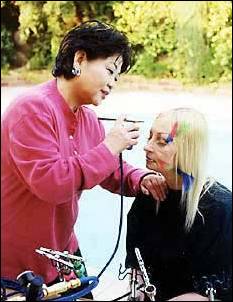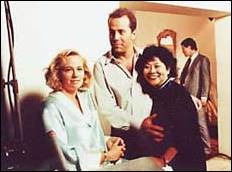Japanese makeup artist dazzles behind the Hollywood scene
By Keiko Uesugi
Mainichi Shimbun
 |
|
|
Kaori
Nara Turner (left) was born in Tokyo in 1933. She began to train in
traditional Japanese dance and tap dancing at the age of six and became
a professional dancer at 14. After some years as a top star of Asakusa's "Shinsekai," she moved to the United States. After her marriage, a torn ligament forced her into retirement. She began to help her husband with his work, and eventually became a makeup artist in her own right. In 1978, she became an official member of Hollywood's Makeup Artists' Union (1600 members), which was a first for a Japanese national. Today, she is the only Japanese listed among the union's 300 "top artists." | |
The year was 1966, and the bride, Kaori Nara, felt like a heroine in a Hollywood film. In fact, the ship happened to be the one on which "The Sand Pebbles," a film starring Steve McQueen, was being shot, so the wedding was virtually a scene from a Hollywood movie.
Kaori was a dancer in those days, and she was part of a show presented at a Hong Kong hotel. The "The Sand Pebbles" film crew were staying at that particular hotel, and they looked in on the show one night.
A few days later, Bill asked Kaori out to dinner; two weeks later, he proposed. She said no, but then Steve McQueen, whose makeup man Bill happened to be, dropped in to tell her what a wonderful guy Bill was.
Soon afterwards, when police stopped Kaori one night for violating the late-night curfew, it was Bill who rescued her. That was when she decided to say yes. A month and a half after meeting Bill, Kaori became Kaori Nara Turner.
"I was 31 and he was 40. Bill was looked upon as one of Hollywood's most handsome and eligible bachelors, so both the Hollywood and Hong Kong papers made a great fuss about the wedding," eminisces Kaori. Bill died ten years ago, and the newspaper clippings are some of Kaori's most precious souvenirs of that happy time.
After their marriage, the Turners set up housekeeping in Los Angeles. Kaori became a makeup artist like her husband, and after working on several hit movies and TV dramas, she had a reputation to rival her husband's. "Star Trek," "Cannonball 2," "American Beauty," "Charlie's Angels," "Ali McBeal," and "ER" are some of the shows she has worked on. It was especially after the 1983 film "Flash Dance," where she did body makeup work on four stand-in dancers to make them look like the same person, that she won a reputation for first-rate work.
 |
|
|
Kaori Nara Turner (right) and Bruce Willis (center) |
|
The "secrets" of Kaori's rise to the top are, in addition to her technique, the bright smile that has earned her the nickname of "Miss Sunshine," and her "magic hands." Every morning, she smiles brightly at grumpy stars and massages them into relaxation before transforming them into stars with her makeup techniques. Julie Andrews, Kim Basinger and many others stars would often ask for her by name, saying that Kaori's massages were the best way to relax.
Kaori deplores the coolness of the Japanese government towards expatriates, but at least one local government did not miss the opportunity to applaud her hard work. Over four days starting on February 14, the city of Yubari in Hokkaido hosted an event called the "Yubari International Fantastic Film Festival 2002" and awarded her the "Max Factor Beauty Spirit Award" -- given to women who excel in the film industry.
Kaori's bright smile and magic hands charmed people in Hokkaido too. "I did a free makeup show at a local beauty shop. When a woman who had never worn makeup in her life declared that she was so pleased that she wouldn't wash her face that night, it brought tears to my eyes."
In November 2001, Kaori published a book from
Kadokawa Shoten called "Makeup Hollywood." The proceeds from the book
will be donated to a retirement home for Japanese expatriates living in
the United States. "I want to help the people who came before me to
this foreign country and worked hard to get by, and I also want to
learn more about the goodness of people. I still have a lot to learn."
Source: Mainichi Daily News - 19 March 2002